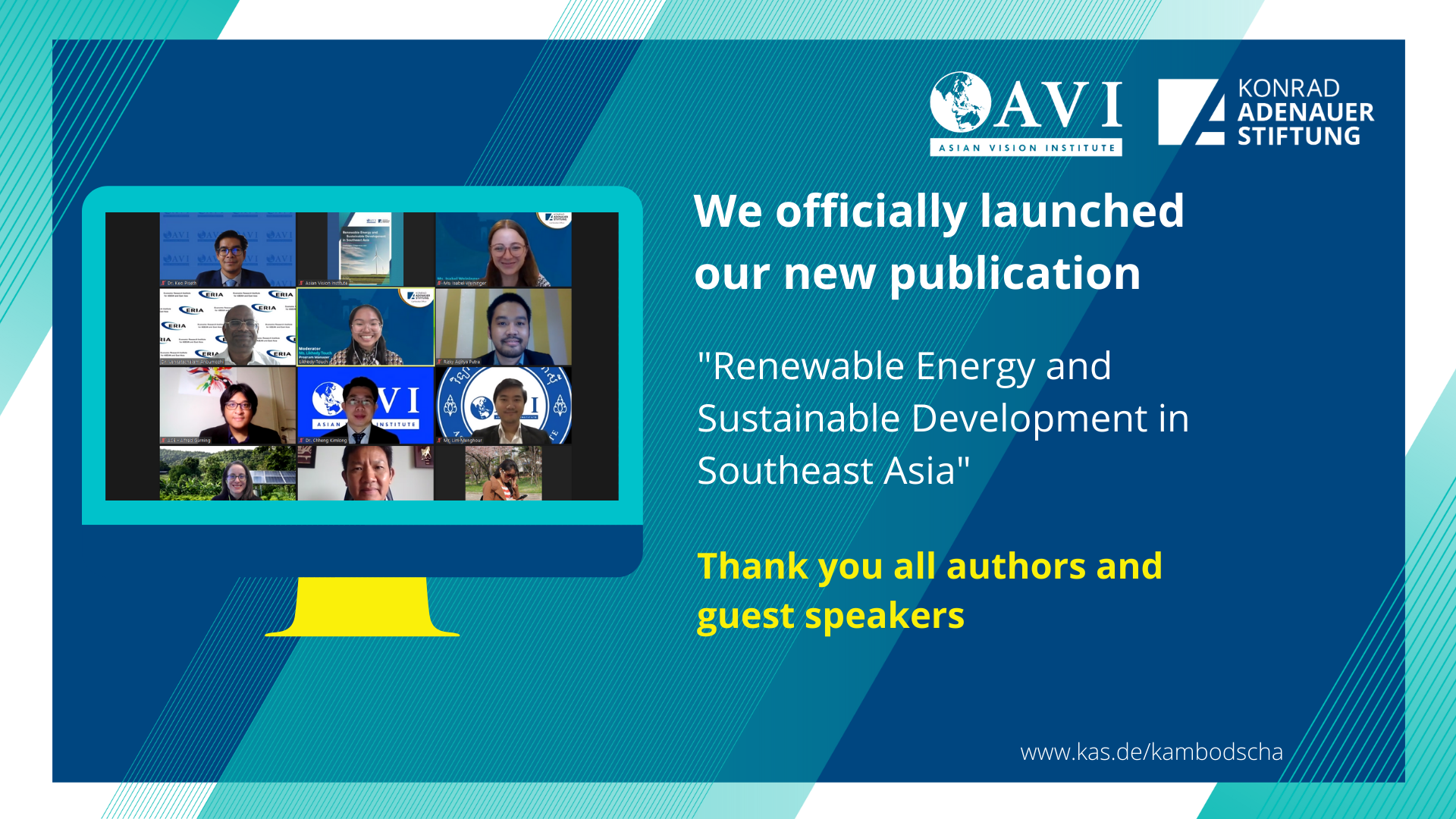On Friday, 26th March 2021, KAS Cambodia co-organized the virtual digital book launch of Renewable Energy and Sustainable Development in Southeast Asia with the Asian Vision Institute (AVI), a local independent think tank promoting inclusive, adaptive and sustainable societies in Asia.
The event was opened by Dr. Chheng Kimlong, 2nd Vice President and Director of the Centre for Governance, Innovation and Democracy at AVI, and Ms. Isabel Weininger, KAS Representative to Cambodia. The introductory statements provided insights also on the German Energiewende, as Germany has managed to cut down its greenhouse emissions by 42 percent from its 1990 emissions level and is contributing to turn EU carbon-neutral by 2050. Yet with such heavy reliance on weather-dependent renewables, there are questions remaining and challenging Germany and the European Union (EU). For example, “What happens when the sun does not shine and the wind does not blow? And what about the short, cold days of mid-winter?”. Likewise, in Southeast Asia, there are also a set of opportunities and challenges for the region when discussing “Renewable Energy and Sustainable Development”.
Before the discussion, Dr. Keo Piseth, 1st Vice President and Director of Sustainable Development Studies of AVI gave a brief introduction of the publication by highlighting the significance of the topic during this time as we can see the high population growth in the region, which is a reflection of the increasing demand for energy usage.
The discussion was divided into two parts: (1) Challenges and Recent Development in Energy Sector and (2) Cooperation on and Investment in Renewable Energy.
Dr. Han Phoumin, Senior Energy Economist at the Economic Research Institute for ASEAN and East Asia (ERIA) from Jakarta, Indonesia started the first part of the discussion by addressing the topic of “Energy Demand and Supply and Potential Distributed Energy System in Southeast Asia”. His presentation covered the technological system and framework to support renewable energy and policy implications in the region.
Following the demand and supply of renewable energy in Southeast Asia, Dr. Venkatachalam Anbumozhi, Senior Energy Economist at the Economic Research Institute for ASEAN and East Asia (ERIA) from Jarkata, Indonesia shared his research on “Challenges and Opportunities for Renewable Energy Supply in the Mekong region”, where he focused on energy integration and connectivity. Then, Mr. Alfred Christopher Gurning, technical officer for ASEAN Plan of Action for Energy Cooperation in Jarkata, Indonesia added on the discussion about the Mekong region, yet more into the current prospects of renewable energy consumption and production.
For this first part of the discussion, questions from Zoom participants arose on the impact of energy demand especially during Covid-19 pandemic on the energy sector and how the aftermath might contribute to climate change.
During the second part of the discussion, Mr. Rizky Aditya Putra, Senior Officer of the ASEAN Plan of Action for Energy Cooperation, started by addressing the insights of bilateral and regional cooperation on renewable energy development, especially the key strategies in ASEAN.
Besides ASEAN Cooperation on Renewable Energy, Mr. Lim Menghour, Deputy Director of Mekong Centre for Strategic Studies of AVI from Cambodia, further extended the discussion to “Geopolitics of Energy Cooperation between the Mekong region and External powers” involving China, the U.S., India, Korea, and Japan.
The very last topic of the panel was “Consolidating Cambodia’s Clean Energy Opportunity” by Ms. Anna Cain, Clean Energy Advocate at Energy Lab Cambodia from Australia. She shared specifically the case of Cambodia and how far Cambodia has come in exploring clean energy.
After the presentations of the authors during the general Q&A session, participants were questioning for example how the private sector could contribute to clean energy, whether Cambodia should liberalize its electricity sector to create more market competition in the country and what the economic benefits of clean energy would be for developing countries such as Cambodia.
In the conclusion of the digital launch, Dr. Chheng Kimlong, 2nd Vice President and Director of the Centre for Governance, Innovation and Democracy at AVI, synthesized key takeaways from the discussion and emphasized the importance of renewable energy and sustainable development, including providing some future regional outlook for Southeast Asia.



